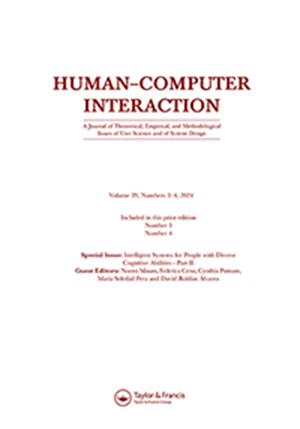面向认知障碍人士的真正可访问mooc:一项实地研究
IF 4.4
2区 工程技术
Q1 COMPUTER SCIENCE, CYBERNETICS
引用次数: 1
摘要
《残疾人权利公约》是向签署国提供的一个重要框架,用于改善其社会包容,特别是在促进平等受教育机会方面(UN, 2007)。它促进他们充分参与教育系统,使他们能够定义自己的专业项目,并最终在他们生活的各个领域做出自己的选择(Ryan & Deci, 2000)。众所周知,教育是塑造人生历程和就业能力的决定性因素。然而,在世界范围内,残疾人的就业率明显低于非残疾人,而且当他们被雇佣时,在公司内成长和发展职业生涯或在就业市场上专业发展的机会更少(Hästbacka等人,2016)。残疾人士和雇主给出的原因之一是,他们仍然面临接受教育的障碍,因此比一般人群拥有更少的专业资格(WHO, 2011)。对于有精神健康问题或认知障碍(例如,记忆障碍、注意力障碍)的人来说,这些困难更为严重,他们的就业率最低(Thornicroft等人,2010),而且通常在隔离的环境中工作(Verdonschot等人,2009)。我们工作的整体目标,是透过新的电子学习系统,进一步增加残疾人士,特别是有认知障碍的残疾人士(不论身体状况如何)接受教育的机会,协助他们融入专业和社会。我们主要关注大规模在线开放课程(MOOC)平台,它在向普通人群提供的学术和终身职业培训项目中发挥着越来越重要的作用,并且仍在强劲增长(Shah, 2019)。此外,它们具有足够的灵活性和适应性,可以潜在地确保尽可能多的学习者能够获得内容,并且可以使用适合认知障碍患者的教学方法来支持他们的学习。本文章由计算机程序翻译,如有差异,请以英文原文为准。
Toward truly accessible MOOCs for persons with cognitive impairments: a field study
The Convention on the Rights of Persons with Disabilities (PWDs) is an essential framework provided to the signatory States for improving their social inclusion, particularly with regard to the promotion of equal access to education (UN, 2007). It promotes their full participation in education systems, enabling them to define their professional project and, ultimately, to make their own choices in all areas of their lives (Ryan & Deci, 2000). It is well recognized that education is a decisive factor in shaping life-course and employability. Yet across the world, PWDs experience significantly lower employment rates than persons without disabilities, and when they are employed, have fewer opportunities to grow and develop their careers within a company or to evolve professionally in the job market (Hästbacka et al., 2016). One of the reasons given by both PWDs and employers is that they still face barriers to access education, and therefore have fewer professional qualifications than the general population (WHO, 2011). These difficulties are even more significant for individuals with mental health difficulties or cognitive impairments (e.g., memory disorders, attention disorders) who experience the lowest employment rates (Thornicroft et al., 2010) and are most often employed in a segregated environment (Verdonschot et al., 2009). The overall objective of our work is to further increase the access to education for PWDs, notably those with cognitive impairments (regardless of medical conditions), through new e-learning systems, to contribute to their professional and social inclusion. We focused primarily on MOOC (Massive Open Online Courses) platforms, which are playing an increasingly important role in the academic and lifelong vocational training programs offered to the general population, and which are still growing strongly (Shah, 2019). Moreover, they are sufficiently flexible and adaptable to potentially ensure that content can be made accessible to as many learners as possible and that pedagogical approaches adapted to people with cognitive impairments can be used to support their learning.
求助全文
通过发布文献求助,成功后即可免费获取论文全文。
去求助
来源期刊

Human-Computer Interaction
工程技术-计算机:控制论
CiteScore
12.20
自引率
3.80%
发文量
15
审稿时长
>12 weeks
期刊介绍:
Human-Computer Interaction (HCI) is a multidisciplinary journal defining and reporting
on fundamental research in human-computer interaction. The goal of HCI is to be a journal
of the highest quality that combines the best research and design work to extend our
understanding of human-computer interaction. The target audience is the research
community with an interest in both the scientific implications and practical relevance of
how interactive computer systems should be designed and how they are actually used. HCI is
concerned with the theoretical, empirical, and methodological issues of interaction science
and system design as it affects the user.
 求助内容:
求助内容: 应助结果提醒方式:
应助结果提醒方式:


